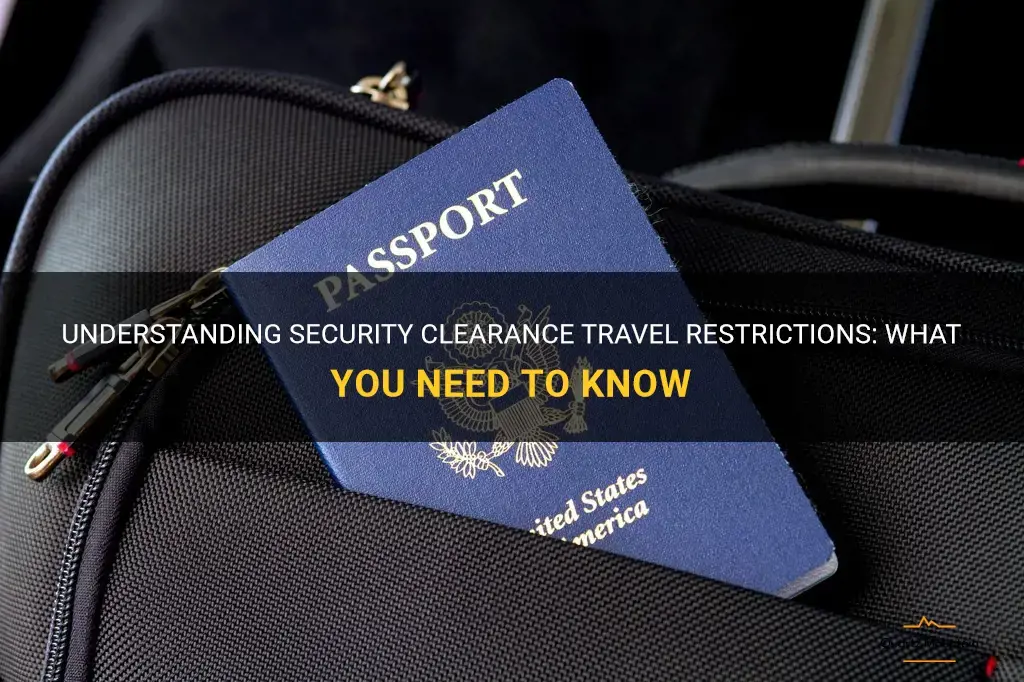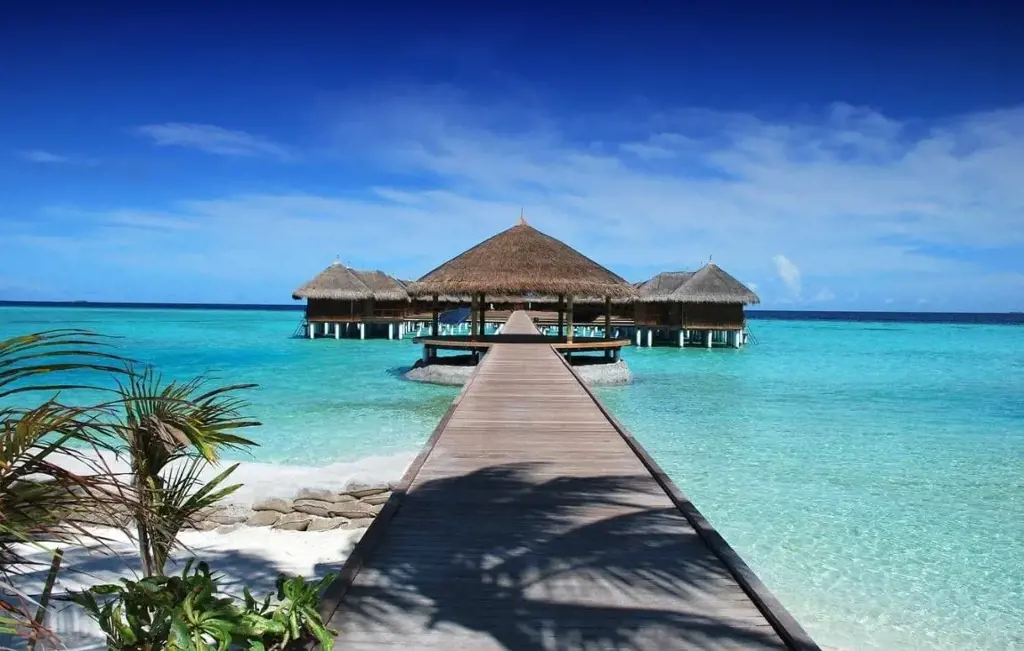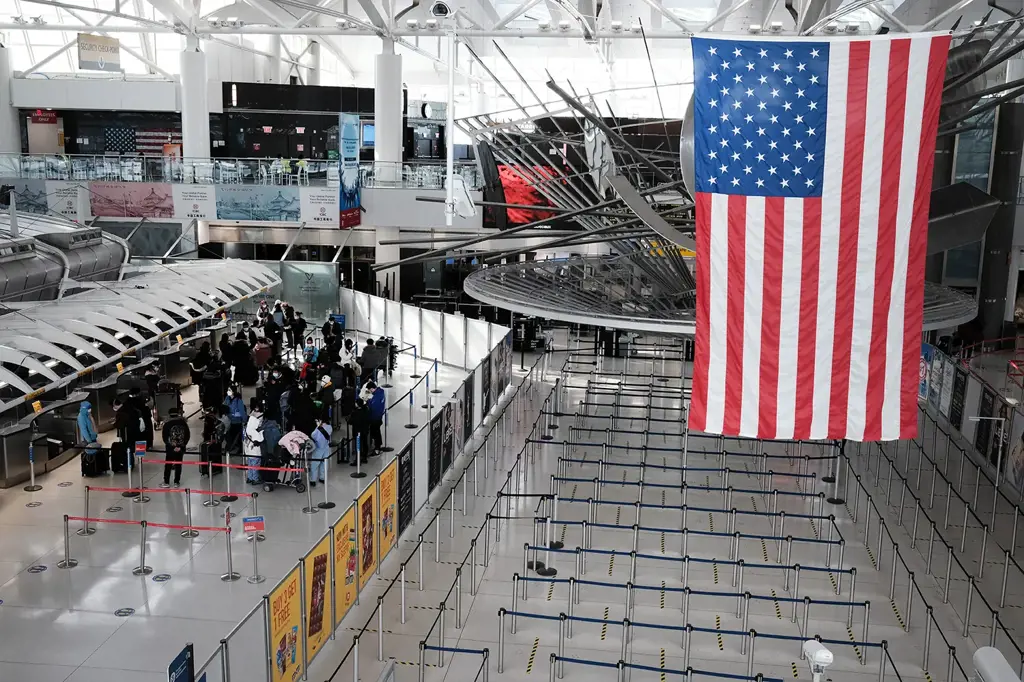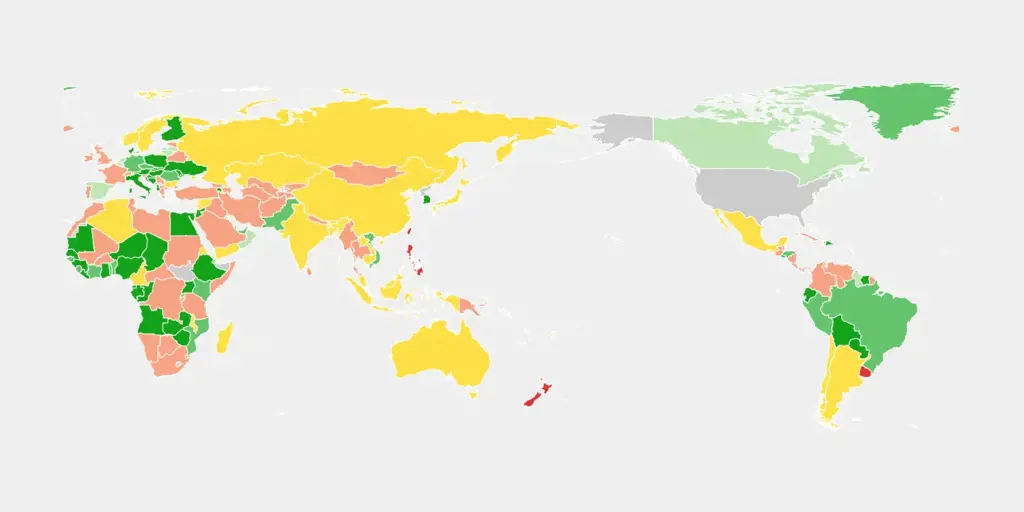
Imagine a world where traveling freely is an everyday luxury, a world where passports don't dictate your freedom to explore. Unfortunately, in the realm of security clearance, this idea is far from reality. Security clearance travel restrictions put a damper on the wanderlust of those entrusted with classified information, adding an extra layer of caution to their passport-stamped adventures. In this article, we'll delve into the intricacies of security clearance travel restrictions, examining the reasons behind them and their impact on the lives of those affected. So, buckle up and prepare for a journey through the realm of security clearance and the travel restrictions that bind it.
What You'll Learn
- What is the purpose of security clearance travel restrictions?
- How do security clearance travel restrictions differ for different levels of security clearance?
- What types of activities are typically restricted for individuals with security clearance?
- How do security clearance travel restrictions affect individuals in high-level government positions?
- Are there any exceptions to security clearance travel restrictions in certain circumstances?

What is the purpose of security clearance travel restrictions?

Security clearance travel restrictions are put in place to ensure the safety and security of individuals and sensitive information. These restrictions are typically applied to individuals who hold security clearances, which grants them access to classified or sensitive information.
The purpose of security clearance travel restrictions is to prevent unauthorized disclosure or compromise of classified information. This is achieved by controlling and monitoring the travel and movements of individuals with security clearances.
One of the key reasons for these restrictions is to prevent espionage or intelligence gathering. By limiting the travel of individuals with security clearances, the risk of them being targeted by foreign intelligence agencies or hostile entities is reduced. These restrictions ensure that individuals with access to classified information are not put in a position where they could be coerced or manipulated into divulging sensitive information.
Additionally, travel restrictions also help in protecting classified or sensitive facilities from potential threats. By controlling the movements of individuals with security clearances, unauthorized access to these facilities can be minimized. This helps in maintaining the security and integrity of these facilities, which may contain valuable assets or information.
Furthermore, security clearance travel restrictions also serve to protect the privacy of individuals. By keeping their travel information limited and confidential, the risk of their personal information falling into the wrong hands is minimized. This helps in safeguarding their personal safety and well-being.
It is important to note that these travel restrictions are not intended to be overly restrictive or burdensome. Instead, they are designed with the intention of striking a balance between granting individuals access to classified information while ensuring their safety and security.
In conclusion, the purpose of security clearance travel restrictions is to protect individuals with security clearances, prevent unauthorized disclosure of classified information, safeguard sensitive facilities, and ensure the privacy and safety of individuals. These restrictions play a crucial role in maintaining the integrity and security of classified information and assets.
Exploring the Enchanting Faroe Islands: Current Travel Restrictions and Guidelines
You may want to see also

How do security clearance travel restrictions differ for different levels of security clearance?

Security clearance is a crucial aspect of national security, and it comes with certain restrictions when it comes to travel. These restrictions can vary depending on the level of security clearance an individual has. In this article, we will explore how security clearance travel restrictions differ for different levels of security clearance.
Firstly, it is important to understand that security clearance is divided into different levels, such as Confidential, Secret, and Top Secret. The level of clearance determines the sensitivity of the information an individual has access to and the level of trust that is placed in them. Consequently, the level of security clearance also impacts the travel restrictions imposed on individuals.
For individuals with Confidential clearance, the travel restrictions are relatively minimal. Generally, they are allowed to travel within the country without any special permissions or notifications. However, it is important for them to maintain situational awareness when traveling, ensuring that they do not discuss or disclose any classified information.
Moving up to Secret clearance, the travel restrictions become more stringent. Individuals with Secret clearance may be required to report their travel plans to their security officer or department. This is done to ensure that any potential risks associated with the travel, such as visiting high-risk areas or countries, can be assessed. It is also important for individuals to be mindful of their actions and conversations during travel, as they may still be exposed to sensitive information that should not be discussed in public.
Finally, individuals with Top Secret clearance face the most significant travel restrictions. Travel plans must be submitted well in advance to allow for a thorough security review. This review evaluates potential risks associated with the travel and determines if any additional precautions or limitations need to be imposed. Additionally, individuals with Top Secret clearance may also be required to undergo briefings or training specific to the travel destination.
It is essential for individuals with security clearance to adhere to these travel restrictions to maintain the integrity of classified information and protect national security. Violating these restrictions can result in severe consequences, including loss of security clearance or criminal charges.
In summary, security clearance travel restrictions differ based on the level of security clearance an individual holds. From minimal restrictions for Confidential clearance to more stringent requirements for Secret clearance, and significant limitations for Top Secret clearance, each level of security clearance imposes specific travel restrictions to ensure the protection of classified information and national security. It is essential for individuals with security clearance to fully understand and comply with these restrictions when traveling to maintain the integrity of their clearance and the safety of sensitive information.
Understanding Travel Restrictions in Tibet: What You Need to Know
You may want to see also

What types of activities are typically restricted for individuals with security clearance?

Individuals with security clearance must adhere to a set of regulations and guidelines that govern their behavior and activities, in order to protect classified information and maintain national security. These restrictions vary depending on the level of security clearance held by the individual, but some common activities that are typically restricted include:
- Disclosure of Classified Information: Individuals with security clearance are prohibited from disclosing any classified information to unauthorized individuals or entities. This includes sharing information with family members, friends, or even discussing classified matters in public places.
- Interaction with Foreign Nationals: Individuals with security clearance may be restricted in their interactions with foreign nationals, particularly those from countries deemed to be potential threats. These restrictions can include limitations on personal relationships, such as romantic involvement, friendships, or even certain professional interactions.
- Travel Restrictions: Individuals with security clearance may have restrictions placed on their travel, particularly to certain countries or regions that are considered high-risk or have sensitive information. This may include limitations on travel to countries with known terrorist activities or restricted access to certain military installations or research facilities.
- Financial Dealings: Individuals with security clearance may face restrictions on their financial activities, such as investments or business dealings, particularly if they involve foreign entities or industries with potential security implications. This is to prevent conflicts of interest, potential insider trading, or exploitation by foreign interests.
- Online Activities: Individuals with security clearance may be subject to monitoring of their online activities, including social media usage and online interactions. Any posts or discussions that could potentially compromise classified information or indicate questionable behavior may be considered a violation of security clearance guidelines.
- Drug and Alcohol Use: Individuals with security clearance may be subject to periodic drug and alcohol testing. Any substance abuse issues could be seen as a security risk, as they could compromise an individual's judgment and reliability.
- Personal Conduct: Individuals with security clearance are expected to maintain a high level of personal conduct and integrity. Any behavior that raises ethical or moral concerns, such as criminal activity, dishonesty, or associations with criminal organizations, can lead to the revocation or suspension of security clearance.
It is essential for individuals with security clearance to fully understand and comply with these restrictions, as any violation can not only lead to the loss of security clearance but also legal repercussions. It is important for individuals with security clearance to consult their security officer or contact their agency's security office for detailed guidance on the specific restrictions that apply to them based on their level of clearance.
Understanding Ulster County Travel Restrictions: What you Need to Know
You may want to see also

How do security clearance travel restrictions affect individuals in high-level government positions?

Security clearance travel restrictions play a vital role in ensuring the security and integrity of high-level government positions. These restrictions are put in place to protect sensitive information and prevent unauthorized access to classified material. While they may seem restrictive, they are necessary to maintain the trust and confidence in government officials.
One of the primary impacts of travel restrictions on individuals in high-level government positions is the limitation on international travel. Individuals with security clearance are often restricted from traveling to certain countries, particularly those with a high risk of espionage or terrorism. This is done to minimize the potential for foreign adversaries to exploit government officials and gather classified information.
Another impact of security clearance travel restrictions is the requirement for individuals to report their travel plans and provide detailed itineraries. This allows security personnel to review and assess the potential risks associated with the travel. In some cases, individuals may be required to obtain approval before traveling to certain locations or attending specific events. This level of scrutiny ensures that government officials are not unwittingly putting themselves or the country at risk.
Additionally, security clearance travel restrictions may require individuals to undergo additional screening and vetting procedures before traveling. This can include enhanced background checks, interviews, and even polygraph examinations. While these measures may be time-consuming and intrusive, they are necessary to mitigate the potential for security breaches and protect national interests.
Furthermore, security clearance travel restrictions can have a significant impact on personal and professional relationships. Individuals with high-level government positions may find it difficult to maintain regular contact with family and friends, especially if they are stationed abroad or travel frequently. Moreover, the limitations on their travel can hinder their ability to attend important conferences, meetings, or diplomatic events, potentially affecting their career advancement.
Overall, while security clearance travel restrictions may impose certain limitations and inconveniences on individuals in high-level government positions, they are critical for protecting national security interests. These restrictions ensure that sensitive information remains secure and prevent unauthorized access to classified material. Although they may pose challenges in terms of personal and professional life, individuals with security clearance understand the gravity of their role and the importance of upholding national security.

Are there any exceptions to security clearance travel restrictions in certain circumstances?

When it comes to security clearance travel restrictions, the general rule is that individuals with certain types of security clearances are subject to travel restrictions to certain countries and regions deemed to pose risks to national security. However, there are certain circumstances where exceptions to these travel restrictions can be made.
One common exception is for individuals who are employed in positions that require international travel as part of their job duties. These individuals may be granted a specific exception to travel to restricted countries or regions for work-related purposes. This exception is typically granted on a case-by-case basis, and the individual must provide a valid justification for the travel, such as attending a conference or meeting with foreign counterparts.
Another exception is for individuals who are participating in government-sponsored programs or initiatives that involve travel to restricted countries or regions. These programs may include diplomatic missions, humanitarian aid missions, or cultural exchange programs. In these cases, the individual's participation in the program may warrant an exception to the travel restrictions, as it is deemed to serve a greater national interest.
There may also be exceptions for individuals who have family members or close personal ties in restricted countries or regions. These exceptions are typically granted on a compassionate basis, allowing the individual to travel to the country or region to visit their family or attend important family events. However, these exceptions are usually subject to additional scrutiny and may require the individual to report their travel plans and activities while in the restricted country or region.
It is important to note that these exceptions to security clearance travel restrictions are not guaranteed, and each case is evaluated on its own merits. The granting of an exception is ultimately at the discretion of the relevant security clearance authority, and the individual must provide a compelling reason for the exception to be considered.
Furthermore, even if an exception is granted, there may still be additional security measures or requirements imposed on the individual, such as increased monitoring or reporting. These measures are put in place to mitigate the potential risks associated with travel to restricted countries or regions.
In conclusion, while security clearance travel restrictions are generally strict and apply to individuals with certain types of security clearances, there are certain circumstances where exceptions can be made. These exceptions are typically granted for work-related purposes, government-sponsored programs, or compassionate reasons. However, the granting of an exception is not guaranteed and is subject to a case-by-case evaluation by the relevant security clearance authority.
Frequently asked questions
Yes, individuals with security clearance are subject to travel restrictions. These restrictions are in place to protect sensitive information and national security interests.
Yes, individuals with security clearance can travel internationally. However, they may be required to obtain approval and follow certain protocols before and during their trip. This could include notifying their security officer, providing a detailed itinerary, and following any specific travel restrictions or guidelines.
Failing to comply with travel restrictions can have serious consequences for individuals with security clearance. They may face disciplinary action, lose their clearance, or even be subject to legal consequences. It is important for individuals with security clearance to understand and diligently adhere to any travel restrictions in place.







